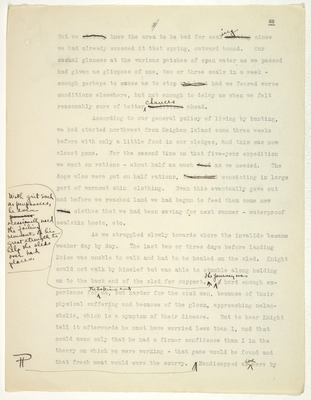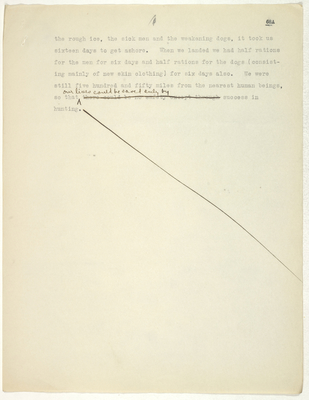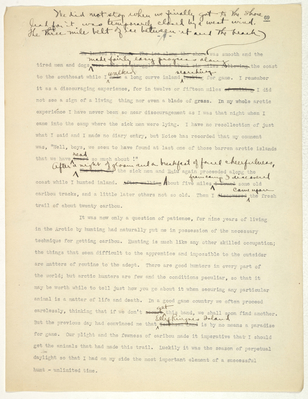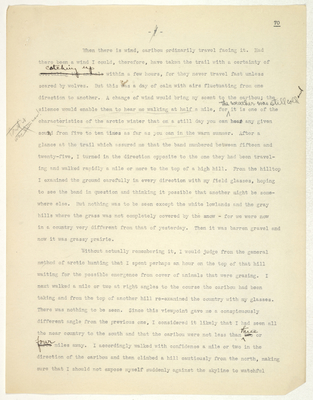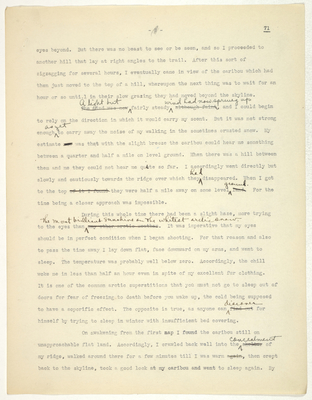Pages
stefansson-wrangel-09-27-025
68
But we already knew the area to be had for sealing hunting since we had already crossed it that spring, outward hound. Our casual glances at the various patches of open water as we passed had given us glimpses of one, two or three seals in a week - enough perhaps to cause us to stop and hunt had we feared worse conditions elsewhere, hut not enough to delay us when we felt reasonably sure of better chances conditions ahead.
According to our general policy of living by hunting, we had started northwest from Meighen Island some three weeks before with only a little food in our sledges, and this was now almost gone. For the second time on that five-year expedition we went on rations - about half as much food as we needed. The dogs also were put on half rations, their food consisting in large part of wornout skin clothing. Even this eventually gave out and before we reached land we had begun to feed them some new skin clothes that we had been saving for next summer - waterproof sealskin boots, etc.
As we struggled slowly towards shore the invalids became weaker day hy day. The last two or three days before landing Noice was unable to walk and had to he hauled on the sled. Knight could not walk by himslef hut was able to stumble along holding on to the back end of the sled for support. With grit such as few [possers], he even possers occasionally used the failing remnants of his great strength to help the sleds over bad places.The journey was hard enough experience for the Eskimos and me, but harder for the sick men, because of their physical suffering and because of the gloom, approaching melancholia, which is a symptom of their disease. But to hear Knight tell it afterwards he must have worried less than I, and that could mean only that he had a firmer confidence than I in the theory on which we were working - that game would be found and that fresh meat would cure the scurvy. Handicapped as we were by
stefansson-wrangel-09-27-026
68A
the rough ice, the sick men and the weakening doga, it took us sixteen days to get ashore. when we landed we had half rations for the men for six days and a half rations for the dogs (consisting mainly of new skin clothing) for six days also. We were still five hundred and fifty miles from the nearest human beings, so that out lives could be saved only by success in hunting.
stefansson-wrangel-09-27-027
69
We did not stop when we finally got to the shore lead for it was temporarily closed by a west wind. The three mile belt of ice between it and the beach We landed at noon. The ice along the shore was smooth and the tired men and dogs were able to struggle ahead about six miles following made fairly easy progress along the coast to the southeast while I walked made a long curve inland searching looking for game. I remember it as a discouraging experience, for in twelve or fifteen miles of walking I did not see a sign of a living thing nor even a blade of grass. In my whole arctic experience I have never been so near discouragement as I was that night when I came into the camp where the sick men were lying. I have no recollection of just what I said and I made no diary entry, but Noice has recorded that my comment was, "We11, boys, we seem to have found at last one of those barren arctic islands that we have heard read so much about!" the sick men and Emiu again proceeded along the
After a night of gloom and a breakfast of foul cheerfulness, The next day the sick men and Emiu again proceeded along the coast while I hunted inland. After walking About five miles from camp I discerned I found some old caribou tracks, and a little later others not so old. Then I discovered came upon the fresh trail of about twenty caribou.
It was now only a question of patience, for nine years of living in the Arctic by hunting had naturally put me in possession of the necessary technique for getting caribou. Hunting is much like any other skilled occupation; the things that seem difficult to the apprentice and impossible to the outsider are matters of routine to the adept. There are good hunters in every part of the world; but arctic hunters are few and the conditions peculiar, so that it may be worth while to tell just how you go about it when securing any particular animal is a matter of life and death. In a good game country we often proceed carelessly, thinking that if we don't secure get this band, we shall soon find another. But the previous day had convinced me that [Ischsen] Land Elly Ringnes Island is by no means a paradise for game. Our plight and the fewness of caribou made it imperative that I should get the animals that had made this trail. Luckily it was the season of perpetual daylight so that I had on my side the most important element of a successful hunt - unlimited time.
stefansson-wrangel-09-27-028
70
- 7 -
When there is wind, caribou ordinarily travel facing it. Had there been a wind I could, therefore, have taken the trail with a certainty of overtaking the animals catching up within a few hours, for they never travel fast unless scared by wolves. But this was a day of calm with airs fluctuating from one direction to another. A change of wind would bring my scent to the caribou; ths silence would enable them to hear me walking at half a mile, for the weather was still cold it is one of the characteristics of the arctic winter that on a still day you can hear any given sound from five to ten times as far as d ou can in the warm summer. After a glance at the trail which assured me that the band numbered between fifteen and twenty-five, I turned in the direction opposite to the one they had been traveling and walked rapidly a mile or more to the top of a high hill. From the hilltop I examined the ground carefully in every direction with my field glasses, hoping to see the band in question and thinking it possible that another might be somewhere else. But nothing was to be seen except the white lowlands and the gray hills where the grass was not completely covered by the snow - for we were now in a country very different from that of yesterday. Then it was barren gravel and now it was grassy prairie.
Without actually remembering it, 1 would judge from the general method of arctic hunting that I spent perhaps an hour on the top of that hill waiting for the possible emergence from cover of animals that were grazing. I next walked a mile or two at right angles to the course the caribou had been taking and from the top cf another hill re-examined the country with my glasses. There was nothing to be seen. Since this viewpoint gave me a conspicuously different angle from the previous one, I considered it likely that I had seen all the near country to the south and that the caribou were not less than three two or four three miles away. I accordingly walked with confidence a mile or two in the direction of the caribou and then climbed a hill cautiously from the north, making sure that I should not expose myself suddenly against the skyline to watchful
stefansson-wrangel-09-27-029
71
- 8 -
eyes beyond. But there was no beast to see or be seen, and so I proceeded to another hill that lay at right angles to the trail. After this sort of zigzagging for several hours, I eventually came in view of the caribou which had then just moved to the top of a hill, whereupon the next thing was to wait for an hour or so unti.l in their slow grazing they had moved beyond the skyline. The wind was now A light but fairly steady wind had now sprung up although faint, and I could begin to rely on the direction in which it would carry my scent. But it was not strong enough as yet to carry away the noise of my walking in the sometimes crusted snow. My estimate [30m] was that with the slight breeze the caribou could hear me something between a quarter and half a mile on level ground. When there was a hill between them and me they could not hear me quite so far. I accordingly went directly but slowly and cautiously towards the ridge over which they had disappeared. When I got to the top of it I found they were half a mile away on some level land ground. For the time being a closer approach was impossible.
During this whole time there had been a slight haze, more trying to the eyes than The most brilliant sunshine on the whitest arctic snow. any other arctic weather. It was imperative that my eyes should be in perfect condition when I began shooting. For that reason and also to pass the time away I lay down flat, face downward on my arms, and went to sleep. The temperature was probably well below zero. Accordingly, the chill woke me in less than half an hour even in spite of my excellent fur clothing. It is one of the common arctic superstitions that you must not go to sleep out of doors for fear of freezing to death before you wake up, the cold being supposed to have a soporific effect. The opposite is true, as anyone can discover find out for himself by trying to sleep in winter with insufficient bed covering.
On awakening from the first nap I found the caribou still on unapproachable flat land. Accordingly, I crawled back well into the concealment shelter of my ridge, walked around there for a few minutes till I was warm again, then crept back to the skyline, took a good look at my caribou and went to sleep again. By
